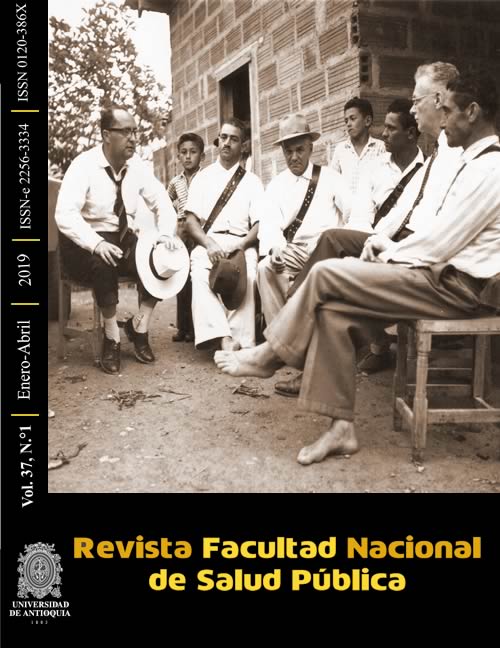National Public Health Experts' Day. Notes Regarding the Acknowledgement of a Necessary Social Practice
DOI:
https://doi.org/10.17533/udea.rfnsp.v37n1a05Downloads
References
Almeida-Filho N, Paim JS. La crisis de la salud pública y el movimiento de la salud colectiva en Latinoamérica. Cuad. Méd. Soc. [internet]. 1999 [citado 2018 nov. 26]; 75:5-30. Disponible en: https://repositorio.ufba.br/ri/handle/ri/6060
Eslava JC. Buscando el reconocimiento profesional: la salud pública en Colombia, en la primera mitad del siglo XX. Bogotá: Universidad Nacional de Colombia; 2004.
Roth Deubel AN. Las políticas públicas y sus principales enfoques analíticos. En: Roth Deubel AN, editor. Enfoques para el análisis de políticas pública. Bogotá: Universidad Nacional de Colombia; 2010.
Cardona Á. 150 años de la primera ley de salud pública en el mundo. Rev. Fac. Nac. Salud Pública [internet]. 1999 [citado 2018 nov. 26]; 16(2):68-81. Disponible en: https://aprendeenlinea.udea.edu.co/revistas/index.php/fnsp/article/view/13402/11990
Leavell H. La escuela de salud pública y la salud internacional. Boletín Ofic. Sanit. Panam. [internet]. 1963; [citado 2018 nov. 25]; 54(2):132-9. Disponible en: http://hist.library.paho.org/Spanish/BOL/v54n2p132.pdf
Quevedo E. El proceso salud-enfermedad: hacia una clínica y una epidemiología no positivistas. En: Cardona A, coordinador. Sociedad y salud. Bogotá: Zeus Asesores; 1992.
Quevedo E, Borda C, Eslava JC, et al. Café y gusanos, mosquitos y petróleo. El tránsito desde la higiene hacia la medicina tropical y la salud pública en Colombia, 1873-1953. Bogotá: Universidad Nacional de Colombia; 2004.
Universidad Nacional de Colombia. Escuela Superior de Higiene. Anuario de la Universidad Nacional de Colombia (1939-1954) [internet]. 1954 [citado 2018 nov. 26]; 131-4. Disponible en: https://revistas.unal.edu.co/index.php/anuarioun/article/view/12774
Gómez RD. La noción de “salud pública”: consecuencias de la polisemia. Rev. Fac. Nac. Salud Pública [internet]. 2002 [citado 2018 nov. 26]; 20(1):101-16. Disponible en: http://aprendeenlinea.udea.edu.co/revistas/index.php/fnsp/article/view/871
Breilh J. Una perspectiva emancipadora de la investigación y acción, basada en la determinación social de la salud. En: Taller latinoamericano sobre determinantes sociales de la salud: documento para la discusión. México: Asociación Latinoamericana de Medicina Social; 2008.
Colombia, Ministerio de Educación Nacional. Sistema Nacional de Información de la Educación Superior (SNIES). Módulo Consultas [internet]. 2018 [citado 2018 nov. 25]; Disponible en: https://snies.mineducacion.gov.co/consultasnies/programa#
Colombia, Ministerio de Educación Nacional. Observatorio laboral para la educación [internet]. 2018 [citado 2018 nov. 25]. Disponible en: http://bi.mineducacion.gov.co:8380/eportal/web/men-observatorio-laboral/ubicacion-geografica
Colombia, Congreso de la Republica. Ley Estatutaria 1751, por medio de la cual se regula el derecho fundamental a la salud y se dictan otras disposiciones (2015 feb. 16).
Colombia, Congreso de la República. Ley 100, Por la cual se crea el sistema de seguridad social integral y se dictan otras disposiciones (1993 dic. 23).
Colombia, Asamble General Constituyente. Constitucióni Política de Colombia (1991 jul. 20).
Colombia, Corte Constitucional. Sentencia T-760/08 (2008 jul. 31).
Colombia, Departamento Administrativo Nacional de Estadísticas (DANE). Clasificación internacional normalizada de la Educación. Campos de educación y formación adaptada para Colombia (CINE-F 2013 A.C.). Bogotá, D.C., Colombia: DANE [internet]; 2018 [citado 2018 dic. 21]; p. 93. Disponible en: https://www.dane.gov.co/files/sen/normatividad/CINE-F-2013-AC.pdf
Published
How to Cite
Issue
Section
License
The contents of the articles are the responsibility of the authors
The editorial committee has editorial independence from the National School of Public Health "Héctor Abad Gómez" of the University of Antioquia.
The editorial committee is not responsible for aspects related to copying, plagiarism or fraud that may appear in the articles published in it.
When you are going to reproduce and disclose photographs or personal data in printed or digital format, informed consent is required. Therefore, this requirement is required of the author at the time of receipt of the manuscript.
Authors are responsible for obtaining the necessary permissions to reproduce any material protected by reproduction rights.
The authors preserve the moral rights and assign the economic rights that will correspond to the University of Antioquia, to publish it, distribute electronic copies, include them in indexing services, directories or national and international databases in Open Access, under the Creative Commons Attribution license -Not Commercial-Share Equal 4.0 International Commercial (CC BY-NC-SA) which allows others to distribute, remix, retouch, and create from the work in a non-commercial way, as long as the respective credit and license are granted. new creations under the same conditions.
The authors will sign the declaration of transfer of economic rights to the University of Antioquia, after the acceptance of the manuscript.
The editorial committee reserves the right to reject the articles whose authors do not offer satisfactory explanations about the contribution of each author, to meet the criteria of authorship in the submission letter. All authors must meet the four criteria of authorship according to ICMJE: "a) .- That there is a substantial contribution to the conception or design of the article or to the acquisition, analysis or interpretation of the data. b) That they have participated in the design of the research work or in the critical review of its intellectual content. c) .- That has been intervened in the approval of the final version that will be published.d). That they have the capacity to respond to all aspects of the article in order to ensure that issues related to the accuracy or integrity of any part of the work are adequately investigated and resolved. "












 --
--  --
--
